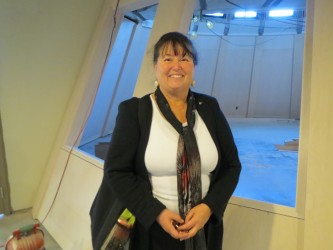Article Origin
Volume
Issue
Year
After years of fighting legal battles, a housing complex that will serve the needs of homeless individuals and couples of Aboriginal descent is set to open its doors in February 2015.
Ambrose Place, named after Ambrose Daniels, an Aboriginal man who died on the street of pneumonia, is a 42-unit, four-floor complex operated by Niginan Housing Ventures. Niginan, which means “home,” is a registered charity formed to address the needs and requirements of Aboriginal people living in Edmonton, especially through providing supportive affordable housing opportunities.
The McCauley Community League took Niginan to court twice to stop the development of Ambrose Place, which is located in the Chinatown area of the McCauley neighbourhood. MCL cited concerns about what they saw as an overabundance of social housing in the area. MCL was unsuccessful, the final appeal being in late October of 2012.
But the court battles, among other issues, left Niginan financially strapped. The Edmonton Inner City Housing Corporation stepped in with financial help and became managing partners.
“From Inner City Housing’s point of view, we see Ambrose Place as an important part of the solution addressing the issue of overcoming homelessness in the inner city. Moreover, we see real social value in the fact that Ambrose Place will be providing culturally sensitive supports for the formerly homeless Aboriginal people that will be living at Ambrose Place,” said Executive Director Cam MacDonald.
Ambrose Place consists of 28 units on the second and third floors which are supportive housing for those who have not been successfully accommodated in existing facilities, while the fourth floor contains 14 units for those seeking safe affordable housing. Residents will be able to move from the supportive housing to independent living while remaining within their existing community.
The facility will operate using a harm reduction model. This model engages in policies, programs, and practises that aim to reduce the harms associated with use of drugs or alcohol rather than the prevention of use.
“Many people drink and use drugs to survive the harsh life of the streets and living homeless. Ambrose Place will provide security, shelter, and food (often tradition food when available). This allows the individual to then focus on their health physically, emotionally, spiritually, and mentally. The Ambrose team will then provide a collective community and programming that enhance and empowers individual choice,” said Carola Cunningham, executive director of Niginan.
Ambrose Place will also provide spiritual and cultural support.
“All spiritual beliefs are welcomed and honoured. No one is expected to follow the red road unless it is their choice,” said Cunningham.
A ceremonial room in Ambrose Place will allow residents to join in daily smudging. Visiting Elders will host various ceremonies at the proper times of the year, and drumming and singing groups will be initiated and encouraged. Yearly medicine picking, attending sweat, Sundances, and fasting lodges will be accessed in the community. In-house Elders will also be on site to perform ceremonies, counselling and teaching opportunities.
“Ambrose Place will endeavour to bring people home to their self-worth and cultural identity. We are confident that when we work and heal together through reclaiming our childhood, working through trauma, adhering to natural law, honouring spiritual practice, and living traditional values, we will lift each other up,” said Cunningham.
In March 2014, McCauley Community League elected an entirely new executive.
“The league recognizes that the process surrounding this project coming into McCauley was difficult, and that some still wonder if another community may have been a more appropriate home,” said President Mike Van Boom. “However, the league is pleased that some of our most hard-pressed citizens will now have strong and safe supportive housing. We are also hopeful that this project will help reduce incidents of disorder in our streets and alleys.”
- 2592 views

